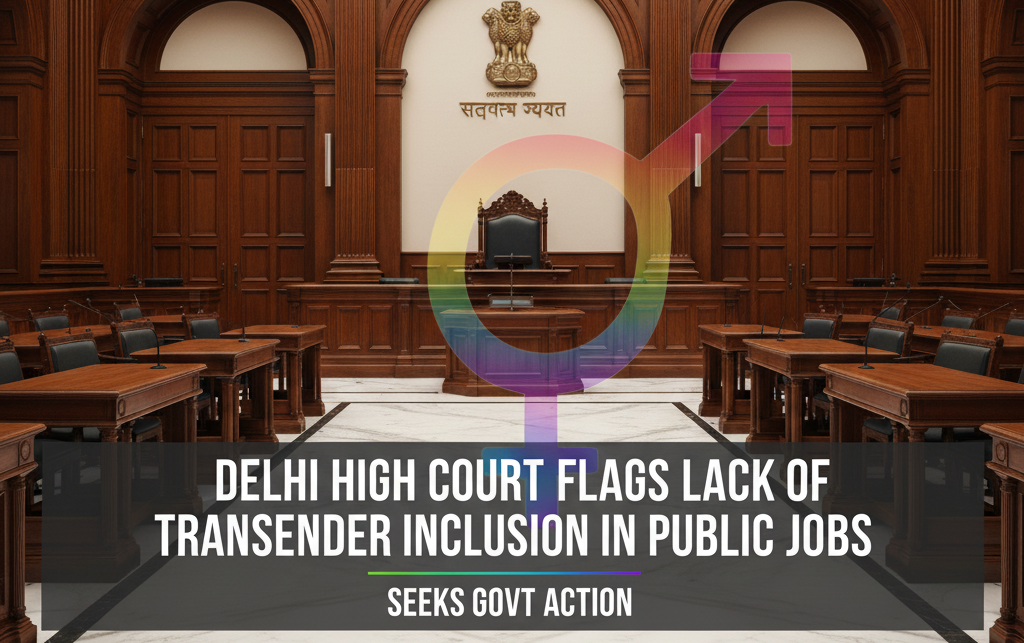The Delhi High Court has turned a petition into a Public Interest Litigation (PIL) to review why transgender persons remain excluded from public sector jobs despite the 2014 NALSA ruling. The court directed the Delhi government to decide within 10 days whether to extend reservation and relaxation benefits in DSSSB recruitment.
Delhi High Court Flags Gaps in Transgender Inclusion in Government Jobs
The Delhi High Court has expressed serious concern over the continued exclusion of transgender persons from public employment in the national capital. A bench headed by Chief Justice Devendra Kumar Upadhyaya and Justice Tushar Rao Gedela recently converted a petition into a Public Interest Litigation (PIL) to look into whether the government has implemented the Supreme Court’s landmark 2014 NALSA judgment, which recognized transgender persons as a “third gender” and directed governments to provide them with equal rights and opportunities.
Background: What the NALSA Judgment Said
In the National Legal Services Authority (NALSA) vs. Union of India case (2014), the Supreme Court declared that transgender persons are entitled to fundamental rights under the Constitution. The judgment ordered both the Central and State governments to take steps to ensure transgender inclusion through education, employment, and social welfare schemes. It also emphasized the need for reservations and relaxations similar to those available to other socially and economically disadvantaged groups.
However, even after more than a decade, the implementation of these directives remains incomplete. While the Transgender Persons (Protection of Rights) Act, 2019, prohibits discrimination in employment, it does not specify the mechanism or percentage for reservations. As a result, government agencies have largely failed to make recruitment processes truly inclusive.
What Triggered the Court’s Intervention
The present case originated when a transgender candidate challenged a Delhi Subordinate Services Selection Board (DSSSB) recruitment notice for court attendant and room attendant posts in the Delhi High Court. The advertisement did not mention any reservation, relaxation in age, or reduction in qualifying marks for transgender applicants — despite an earlier Delhi government order providing such benefits.
The petition argued that excluding transgender-specific provisions effectively prevented qualified candidates from applying and contradicted the spirit of the NALSA verdict. Observing that the issue had wider implications, the Delhi High Court decided to convert the plea into a PIL to examine the overall implementation of transgender rights in public employment.
Court’s Directions to the Delhi Government
During the hearing, the court noted that the Delhi government had already issued a notification in 2021, allowing transgender applicants a five-year relaxation in the upper age limit and a 5% concession in qualifying marks. Yet, the DSSSB recruitment advertisement failed to apply these relaxations.
The bench noted that the absence of clear instructions or a standing policy on reservations had created confusion among departments. It directed the Delhi government to decide within 10 days whether the 2021 relaxations and any other reservation benefits should be extended to transgender applicants in ongoing DSSSB recruitments.
If the government decides to include such provisions, the court instructed the DSSSB to extend the application deadline by one month, allowing transgender candidates a fair opportunity to apply. The decision, once made, must be widely publicized through official channels to ensure transparency and awareness.
Broader Implications of the PIL
The High Court’s decision to treat the case as a PIL means it will now examine broader questions of law and policy, including:
- Whether the Delhi government and DSSSB have implemented the directions of the NALSA judgment.
- Whether the lack of a reservation policy violates the constitutional right to equality and non-discrimination.
- What measures are required to ensure that transgender persons have genuine access to government employment?
The case could potentially push both the Delhi government and other states to draft clear reservation frameworks for transgender persons, similar to those for Scheduled Castes, Scheduled Tribes, and Other Backward Classes.
Why the Issue Persists
Several challenges continue to hinder transgender inclusion in public employment:
- Absence of a uniform reservation policy: While some states, such as Tamil Nadu and Karnataka, have announced quotas for transgender persons, Delhi and many others have not yet done so.
- Poor awareness among recruiting bodies: Government departments often fail to include transgender relaxations in their notifications due to a lack of clarity or administrative inertia.
- Social and bureaucratic stigma: Transgender persons still face significant prejudice, which discourages them from applying for government jobs even when eligible.
- Legal ambiguity: The 2019 Transgender Act mandates equal opportunity but stops short of enforcing quotas, creating a gap between law and practice.
What Comes Next
The Delhi government must now submit its decision within the 10-day deadline. Depending on its response, the High Court may issue further directions to ensure compliance with both the NALSA judgment and the spirit of the Constitution.
If implemented effectively, this case could set a precedent for comprehensive transgender inclusion in public service recruitment — a step toward fulfilling the promise of equality made over a decade ago.
Frequently Asked Questions (FAQ)
What was the 2014 NALSA judgment?
It was a Supreme Court ruling recognizing transgender persons as a third gender and directing governments to provide reservations and other welfare measures to ensure their equality in education and employment.
What did the Delhi High Court recently say?
The court criticized the lack of transgender representation in government jobs and converted an individual plea into a PIL to examine the issue more broadly.
Are there any relaxations for transgender applicants in Delhi?
Yes. A 2021 Delhi government order provides a 5-year age relaxation and 5% concession in qualifying marks, but these are not being consistently implemented.

























